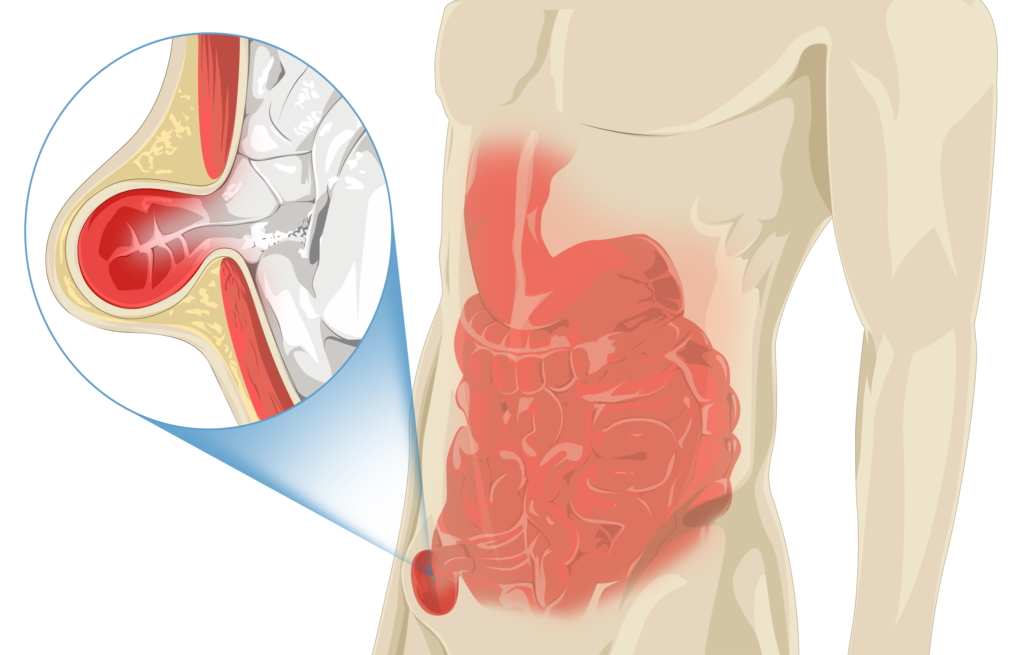10 Questions to Ask During Your Hernia Surgery Consultation in Singapore
Discover when hernia is considered dangerous, the various hernia types...
Home > Inguinal Hernia

An inguinal hernia happens in your groin, in a passageway called the inguinal canal. Inguinal Hernia occurs when abdominal tissue, such as belly fat or a loop of intestines, bulges through an opening in the lower abdominal wall. This is the wall that separates your abdomen from your groin.
In men, inguinal hernias typically develop in the groin area near the scrotum, on one or both sides. The lump often appears when you’re lifting something and disappears when you lie down.
There are also risk factors that may increase the likelihood of an Inguinal Hernia, some of which includes obesity, age, previously having an inguinal Hernia, or having family members with Hernias.
It may include discomfort or pain in the groin area, a visible or palpable bulge in the groin, and a feeling of pressure or weakness in the groin. Sometimes, there may not be any noticeable symptoms at all.
Other symptoms include:
If you spot a bulge in your groin or feel heaviness there, don’t brush it off. You should talk to our inguinal hernia specialist, especially if:
Hernias can be life-threatening, especially if it’s strangulated and not treated early. When in doubt, see a Hernia Specialist early for a peace of mind.
An inguinal hernia can be categorized as “direct” or “indirect” depending on how and when it forms. There’s a good chance that the age and gender of the person with the hernia will have a lot to do with which type of Hernia it is.
A direct inguinal hernia penetrates directly through the wall of your inguinal canal. This type of hernia occurs in adults over time. This is most common in adult males.
A direct inguinal hernia is usually caused by a combination of muscle weakness and increased pressure on the abdominal wall.
When you strain, such as during bowel movements or lifting heavy objects, it can increase the pressure within your abdomen. This pressure can push a weak area of your abdominal muscles through the opening where your femoral artery passes from your pelvis to thigh. This creates a bulge in the groin or scrotum.
An indirect inguinal hernia is most common in children, it affects up to 5 percent of newborns and up to 30 percent of premature babies. Premature infants are especially at risk for indirect inguinal hernias because there is less time for the inguinal canal to close, therefore increasing the risk for a Hernia to form. Often, it is discovered in the first year of life but can also remain undetected until adulthood.
An indirect inguinal hernia are congenital Hernias which typically develop in infancy when an abdomen area called the inguinal rings fails to close. Fat or part of the small intestine slides through the area of weakness into the inguinal canal, causing a Hernia.
The main difference is the location of the Hernia. While a direct inguinal hernia occurs in the lower abdominal wall, an indirect inguinal hernia goes through the inguinal canal and can extend into the scrotum in men.
Lower your chances of complications, see your doctor early and discuss your best treatment options.
A Hernia Specialist or Doctor will conduct a physical examination, checking for any bulges in the groin area. They may also ask questions about your medical history and any symptoms you may be experiencing. In some cases, imaging tests such as an abdominal ultrasound or MRI may be ordered to confirm the diagnosis.
Yes, ultrasound can detect an inguinal hernia by creating images of the abdominal area and identifying any abnormal bulges or protrusions in the groin. This is a non-invasive and painless method of diagnosis that may be used alongside a physical examination to confirm the presence of an inguinal hernia.
Hernias aren’t always serious, but serious complications can develop. Hernias can worsen over time, this is because as the opening becomes weaker and wider, more tissue can push through it. The more this happens, the more likely it is to become trapped. This can be extremely painful, and in worst cases, can be life-threatening.
Some complications that can develop as a result of an inguinal hernia involves:
A part of the bowel becomes stuck in the inguinal canal, causing symptoms such as vomiting, nausea, painful lump and stomach pain
A section of the bowel becomes trapped and blood supply is cut off; this requires emergency surgery within hours to release the trapped tissue and restore its blood supply. It is a medical emergency as the strangulated tissue can release toxins in the bloodstream, causing infection that can lead to sepsis or even death.
Inguinal Hernias are therefore not something to be taken lightly. When in doubt, consult experienced Inguinal Hernia Specialist in Singapore Dr Kan today!



Surgery is necessary to push the protruding tissue back in place, remove any scar tissue, and adhere a surgical mesh on the hernia’s opening to prevent recurrence. An Inguinal Hernia Specialist will repair the weakened area and close the opening to prevent future hernias from forming. There are two types of surgery available:
In some cases, non-surgical options such as wearing a supportive truss or belt may be recommended for those who are not suitable for surgery. However, these options only provide temporary relief and do not repair the hernia permanently.
While an inguinal hernia does not directly cause gas, it can lead to discomfort or pain in the abdomen which may cause a person to feel bloated and gassy. In some cases, the protruding tissue from the hernia can also put pressure on the intestines, leading to bowel issues such as constipation or increased gas production. This is why it is important to seek treatment for an inguinal hernia before it worsens and causes further complications.
It is generally not recommended to play sports or engage in strenuous activities while having an inguinal hernia, as it can worsen the condition and lead to complications. However, every case is different and it is best to consult with a doctor for personalized advice on whether it is safe to continue playing sports with an inguinal hernia. In some cases, wearing a supportive truss or belt during physical activity may be recommended.
Our Hernia Surgeon in Singapore Dr Kan offers the full spectrum of surgical treatments for Inguinal Hernias, including minimally invasive/keyhole procedures such as laparoscopic inguinal hernia repair, which is typically the most common choice amongst experienced surgeons.
With proper care and by following your surgeon’s advice, most patients recover smoothly and are back to feeling like themselves within a few weeks.
Discover when hernia is considered dangerous, the various hernia types...
Discover when hernia is considered dangerous, the various hernia types...
Find out all you need to know about groin hernia...
Here at KYM Surgery, we believe in providing holistic & comprehensive medical care for all patients.
Lower your chances of complications, see your doctor early and discuss your best treatment options.

We understand that hernias are worrying, but they can often be treated early. Here at KYM Surgery, we believe in providing holistic & comprehensive hernia care for all patients.
Hernia Surgery Clinic by KYM Surgery
Copyright © 2024 All rights reserved.